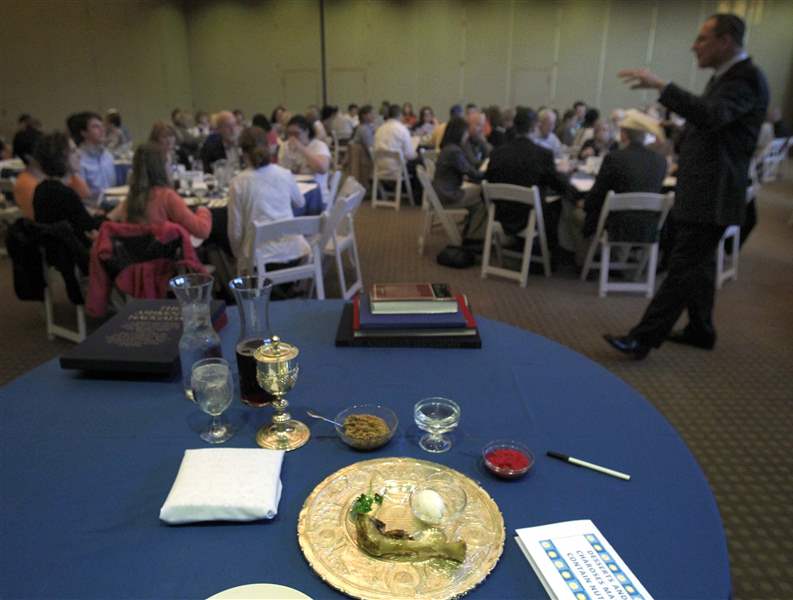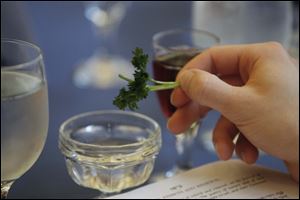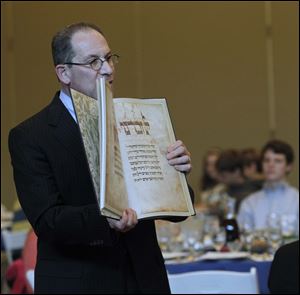
Local Seder celebrates diversity
Interfaith event draws 100 more than 5 years ago
3/31/2012
With elements of a Seder meal in the foreground, Rabbi Sam Weinstein of The Temple-Congregation Shomer Emunim explains the Seder at the Reform Jewish synagogue in Sylvania.
The Blade/Lori King
Buy This Image

With elements of a Seder meal in the foreground, Rabbi Sam Weinstein of The Temple-Congregation Shomer Emunim explains the Seder at the Reform Jewish synagogue in Sylvania.
Two major religions will observe important dates on their calendars as Christians start Holy Week with Palm Sunday and Jews prepare for the start of Passover at sundown Friday.
Jesus' participation in the Jewish Passover Seder is remembered by Christians as the Last Supper, when he broke bread and drank wine with his disciples in the first Holy Communion.
Rabbi Sam Weinstein of The Temple-Congregation Shomer Emunim explained the rich symbolism and tradition, as well as cultural nuances, of the Passover meal in an Interfaith Seder on Wednesday night attended by a diverse group of 140 at the Reform Jewish synagogue in Sylvania.
The Jewish people have been celebrating Passover every year for 3,000 years, remembering the night of the plague that killed the first-born children but passed over the Israelites. They were then released from slavery in Egypt.

The dipping of parsley into salt water during the Seder represents the anguish of the Jews when they were slaves in Egypt.
There is a wealth of diversity in some of the details of the Seder ritual, Rabbi Weinstein said. Specific foods that are used in the meal differ among Jewish groups according to where they come from, he said. For example, Sephardic Jews, who hail from the Iberian peninsula, serve lamb during the Seder meal, but Ashkenazi Jews, who come from Central Europe, serve brisket.
"God is the Creator and we need to continually create," Rabbi Weinstein said in endorsing the variations. "We Jews are hardly a monolithic people. We are monotheistic, but not monolithic."
The rabbi pointed out that there are 3,500 different haggadot, or booklets used as guides for the Passover meal.
"There are only 16 or 17 million Jews in the world, but we need 3,500 different haggadot?" the rabbi asked with a smile.
Matzoh, or unleavened bread, is standard fare at Seder meals, serving as a reminder of the ancient Israelites' hurried exodus from Egypt. The matzoh must be made from scratch in less than 18 minutes, Rabbi Weinstein said.
Among the other elements of a Seder are four cups of wine (grape juice was substituted at the interfaith Seder) which helps break down barriers between people, maror or bitter herbs (horseradish was used Wednesday) to remember bondage in Egypt, a hardboiled egg representing new life and the festival offering made in the ancient Temple in Jerusalem, haroset, a mixture of fruits and nuts symbolizing the mortar Jews used in making bricks in Egypt, and a vegetable or potato dipped in salt water, representing harshness and humility.
No individual names, not even Moses', are mentioned in the haggadah, Rabbi Weinstein said, because the Seder is about community and society. Every individual has the ability to transform society and everyone has the capacity to eradicate slavery and bring people to freedom, the rabbi said.
The Seder is a history lesson, not one that focuses on dates and characters but rather on the "goals we should strive for in our lives," Rabbi Weinstein said.

Rabbi Sam Weinstein shows an ornate haggadah, or Seder guide, at the interfaith Seder.
The Jewish Passover Seder for the Interfaith Community, presented by the Jewish Federation of Greater Toledo and the Jewish Community Relations Council, has grown over the years, with 100 more people attending Wednesday's event than in 2007. But there's room for more, according to Tom Klein of Bowling Green.
"I'd like to see hundreds of people participating," Mr. Klein said. A member of the MultiFaith Council of Northwest Ohio, Mr. Klein said he would like to see the multifaith group's annual spring banquet take the form of a Seder some year.
Joel Moskowicz, 29, of Curtice, who was raised Lutheran and is converting to Judaism, said the Seder was his first and he found it informative, although he noted that the rabbi skipped many details.
"Rabbi Weinstein does a great job of explaining things to gentiles, at dumbing it down. It can get really complicated," he said.
Chabad House-Lubavitch, an outreach to Jews, invites Jews who don't have a family Passover Seder to attend one of theirs, set for 7:15 p.m. on Friday and on April 7. The cost is $36 per adult, $18 per child, with reservations required by calling 419-843-9393.
With Passover's central role in connecting Christianity and Judaism, Seders have become a popular forum among interfaith groups and at Christian churches.
Trinity Episcopal Church in downtown Toledo is to be host for a Passover Seder April 14 at 5:30 p.m. at My Brother's Place, on the second floor of the church facility, 316 Adams St. The deliverance of the Jewish people from slavery in Egypt serves as a reminder that God never stops bringing all of us out of bondage, the church said in its announcement. Reservations are $10 (free for children under 7), due by April 11. Contact Jolene Miller by email, jolene278@gmail.com.
Messianic Rabbi Kirt Schneider of Adat Adonai Messianic Jewish Synagogue in Ottawa Lake, Mich., is sponsoring a Messianic Passover Seder April 7 at 5 p.m. at the Pinnacle banquet hall, 1772 Indian Wood Circle, Maumee. The cost is $25 per adult, $15 per child 10 and under. Information: 419-885-4645.
Contact David Yonke at: dyonke@theblade.com or 419-724-6154.